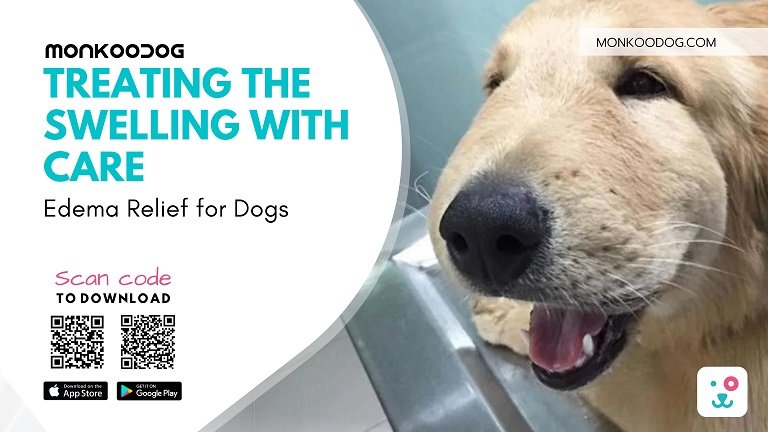
Home » Edema Relief for Dogs: Treating the Swelling with Care
Has your furry companion been experiencing swelling or puffiness lately? You love your furry companion like family, and seeing them in discomfort is heart-wrenching. One common health issue that can trouble your beloved dogs is edema or swelling. When your faithful friend experiences this condition, knowing how to provide the best care becomes a top priority. In this blog we inform you that Edema Relief for Dogs.
It is distressing to witness your pet in pain, and that’s why you need to equip yourself with the knowledge and tools to alleviate their suffering effectively. Edema can arise from various causes, such as injuries, infections, or underlying health conditions.
Recognizing the signs early and understanding the appropriate steps is crucial for your dog’s well-being. Your dog’s health and happiness are of utmost importance, and taking action promptly can prevent potential complications.
Also Read:- Benefits of Hiring a Dog Walker: Enhance Your Pet’s Health and Happiness
Edema occurs when excess fluid accumulates in the tissues, leading to visible swelling. This swelling can be localized, affecting specific areas like the limbs, face, or abdomen, or it may be more widespread, involving the entire body. Various factors can trigger dog edema, including injuries, infections, allergic reactions, heart or kidney issues, and certain medications.
Recognizing edema early is crucial, as it allows prompt intervention and minimizes potential complications. When examining your dog for swelling, consider any unusual changes in its body shape, such as puffiness, tightness, or tenderness in specific areas. Additionally, monitor your pet’s behavior for signs of discomfort, reluctance to move, or changes in appetite.
It’s crucial to note that edema can sometimes be a symptom of an underlying health problem that requires immediate veterinary attention. Therefore, if you notice persistent or severe swelling in your dog, seek medical advice immediately.
During the veterinary evaluation, the veterinarian will conduct a comprehensive physical examination of your dog, paying close attention to the areas affected by edema. They will inquire about your pet’s medical history, recent changes in behavior, and any possible triggers for the swelling. Ensure you’re ready to offer comprehensive details to assist the veterinarian in making an educated diagnosis.
Occasionally, additional diagnostic tests might be required to precisely determine the underlying cause of the edema. These tests may include bloodwork, urine analysis, X-rays, ultrasound, or other imaging techniques. These tests not only aid in identifying the condition but also in ruling out potential health issues.
When it comes to treating edema in dogs, there are several medical options available. One common approach to managing edema is through the use of diuretics, which are medications that promote the excretion of excess fluid from the body. Diuretic medication like furosemide oral solution can be used for managing edema that helps the body eliminate excess fluid through increased urine production.
Furosemide can be beneficial in reducing the swelling caused by conditions such as heart failure or other medical problems, states PetRx. Additionally, it is easy to administer via a dropper, which makes it easy for the pet to consume it properly.
However, it’s crucial to be mindful of the quantity and frequency, which should be carefully matched to your dog’s particular needs. If given in excess amounts, it may induce dehydration and an imbalance of electrolytes.
It is worth noting that according to WebMD, furosemide is often administered orally and can be absorbed in roughly 77% of cases. In between one and two hours following oral furosemide administration, your dog’s urine production increases, and its impact persists for a duration of six hours. When given intravenously, it commences action within five minutes, and within four hours, the urine flow returns to its regular state.
In addition to diuretics, other medications may be prescribed based on the diagnosis made by your veterinarian. Antibiotics can be essential in treating edema caused by infections, while anti-inflammatory drugs can help reduce swelling due to allergies or inflammation.
According to Veterinarians.org, a homemade diet frequently contains ingredients that encourage inflammation. Although these foods don’t necessarily need to be eliminated, dog owners must balance inflammation-causing foods with their anti-inflammatory alternatives.
For instance, processed meats such as sausage, bacon, ham, and foods like refined grains, egg yolk, potatoes, etc., can result in inflammation.
Thus, dietary management is significant in supporting dogs with edema and can complement medical treatment to promote better recovery. Tailoring your pet’s diet based on the underlying cause of the swelling can positively impact their overall health and well-being.
For dogs with edema caused by heart or kidney issues, reducing sodium intake is crucial. Elevated sodium levels can contribute to fluid retention, worsening the swelling. Seek guidance from your veterinarian to ascertain the suitable extent of sodium restriction tailored to your dog’s unique situation.
If edema is connected to food allergies or sensitivities, an elimination diet might be advised. It involves gradually removing potential allergens from your dog’s diet to identify the trigger. Once identified, your vet can guide you in selecting an appropriate hypoallergenic or limited-ingredient diet to manage the condition effectively.
Rest and limited activity are essential during your dog’s recovery from edema. Avoiding strenuous activities and minimizing movement can prevent further stress on affected areas and aid in reducing inflammation.
Elevating the swollen limbs can also assist in decreasing fluid buildup and alleviate discomfort. Gently supporting your dog’s limbs with cushions or pillows while the rest can be beneficial.
Regularly check your pet’s body for any changes or developments in the swelling. Take note of any worsening symptoms, such as increased puffiness or redness, and inform your veterinarian promptly.
In addition to conventional medical treatments, some pet owners explore holistic approaches. Acupuncture, an age-old Chinese tradition, employs the insertion of minuscule needles into precise body points to stimulate energy flow and facilitate the body’s natural healing processes.
Moreover, a veterinarian discovered that acupuncture is effective for many chronic pet diseases in an interview with NPR. She claims that Chinese herbal formulations and vitamins work just as well and may also be used to heal dogs. It is believed to help reduce inflammation and alleviate pain, making it a potentially valuable adjunct therapy for edema.
Massage therapy can also benefit dogs with edema, as gentle and targeted massage techniques may help improve blood circulation and lymphatic drainage, thus reducing swelling and promoting relaxation.
Herbal remedies, such as herbal teas or supplements, sometimes support the body’s natural healing processes and reduce inflammation. However, it’s essential to consult with a veterinarian or a certified herbalist before using any herbs to ensure they are safe and appropriate for your dog’s condition.
Treating the swelling with care is crucial when faced with edema in dogs. You can significantly improve your furry friend’s well-being by understanding the condition, seeking prompt veterinary evaluation, and implementing appropriate medical treatment, dietary management, and home care.
Holistic approaches can also complement conventional methods, promoting overall health and healing. Remember, early recognition and intervention are vital in addressing edema effectively. By providing your dogs with the attention, love, and specialized care they deserve, you can help them overcome swelling, leading to happier and healthier lives for your beloved companions.



